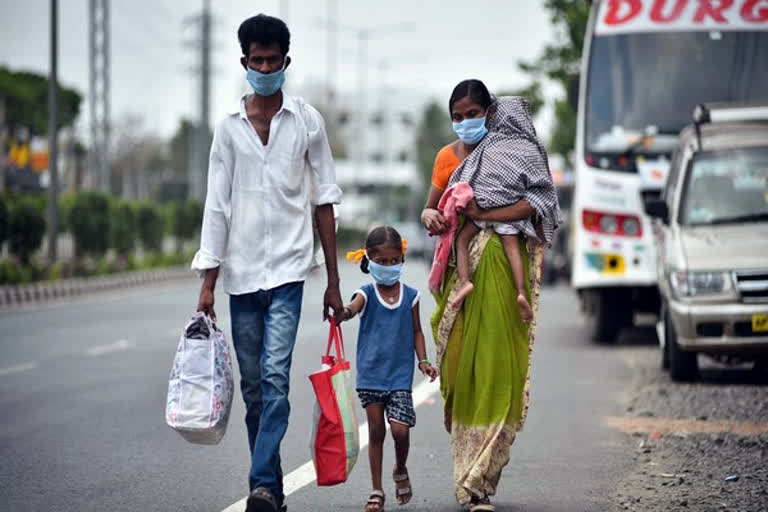Hyderabad: With the 21 day COVID-19 lockdown extended to 40 days and no additional relief measures announced, migrant worker distress will only increase.
Scenes of their discontent and resistance against the lockdown and its extension came to the fore recently in Surat and Mumbai as thousands gathered on the street.
All they want is to be extricated from the continued trauma imposed by the brutal lockdown and be able to go home; the most basic of human needs.
The lockdown decision announced on March 25th, while imminent, was unplanned and unilaterally made without any consultation with the state governments. This caught millions of migrant workers and the bureaucracy off-guard, leaving them no time to plan for such an emergency.
While millions of migrants successfully reached their home states, only to be quarantined in camps, many remain stranded far from home, with no money or food.
Since the lockdown, a group of 73 volunteers, called the Stranded Workers Action Network (SWAN), has been responding to distress calls from migrant workers across the country and making small cash transfers to meet basic needs in addition to connecting workers to local organizations and the administration.
Read more:Covid-19: The economy, where to?
Between March 27th and April 13th, we have interacted with more than 600 groups of stranded workers adding up to nearly 10,000 workers across the country and disbursed Rs 3.8 lakh. While this initiative has been able to document only a fraction of the distress of migrant workers and extend only a fraction of the support they need, we have put together a report that can be found here.
Rajendran Narayanan, Assistant Professor at Azim Premji University in Bengaluru. We hope that the report will amplify their experiences of the lockdown, and make the urgent case for universalising rations to all, cash provision of Rs 7,000 per stranded worker for at least 2 months, and increase feeding centres, among several other immediate measures. This is not research project but a work of relief and through the process we have sought some basic needs from stranded workers to assess how best to provide relief and so the response rate to each statistic mentioned below is different.
The main findings of the report are as follows:
- 50% of workers had rations left for less than 1 day (out of 2707 workers)
- 96% had not received rations from the government (out of 9302 workers) and 70% (out of 2293) had not received any cooked food
- 74% (out of 2518) had less than half their daily wages remaining to survive for the rest of the lockdown period.
- 89% have not been paid by their employers at all during the lockdown (out of 4503 workers)
- 44% of the calls received were “SOS” with no money or rations left or had skipped previous meal
- Rate of hunger is exceeding the rate of relief. Percentage of people who said they have less than 1 day of rations increased from 36% to 50% in the third week of lockdown while the percentage of people who received government rations increased from 1% to only 4% in the third week of lockdown
- The percentage of people who did not get cooked food from the government or any local organisation decreased from 80% to about 70% from the end of second week post lockdown to the end of third week post lockdown
The report includes worker testimonies, data and charts, a view from some states and a set of relief measures that urges the government to take a humane approach to addressing the growing distress of migrant workers while fighting the COVID-19 pandemic.
(Written by Rajendran Narayanan. The author is an Assistant Professor at Azim Premji University in Bengaluru. The author is also a part of the Stranded Workers Action Network (SWAN).)
(Disclaimer: The opinions expressed within this article are the personal opinions of the author. The facts and opinions appearing in the article do not reflect the views of ETV Bharat and ETV Bharat does not assume any responsibility or liability for the same.)
